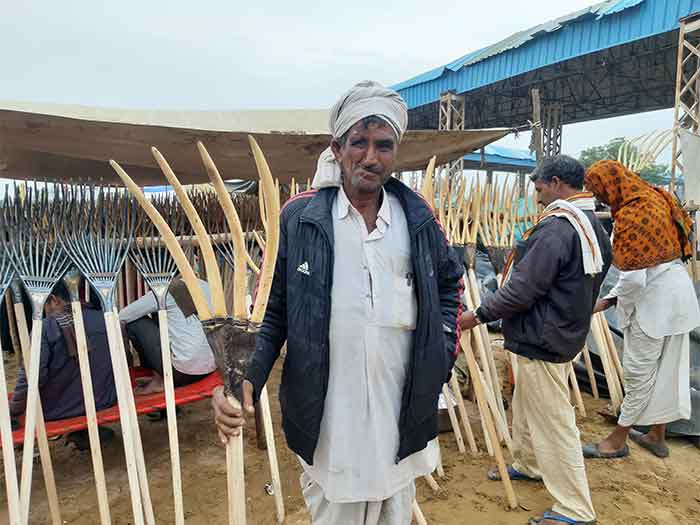
The ‘jheli’ is a wooden rake, popular in both rural and urban areas of Rajasthan and its neighbouring states, for its multiple uses as well as low cost.
Since early 2020 though, with the arrival of the Covid pandemic, the market for this handy instrument has shrunk drastically threatening the livelihoods of hundreds of villagers in parts of Rajasthan who make and sell it.
The fall in demand was most apparent at the Pushkar fair this year, famous for the sale of camels and horses and where usually the jheli would always be a top selling item among farmers and other visitors. The rake is used by farmers and gardeners for loosening soil, handling thorny bushes used to mark crop boundaries and hauling fodder for cattle.
This time the Pushkar fair was held after a gap of two years. Fewer cattle arrivals and lack of cultural programs at the fair also affected the sales of jheli. One vendor told Covid Response Watch that he had goods worth about Rs 3 lakhs, but only 50% of the goods could be sold during the entire fair.
It was almost the same for everyone. Kanaram of Karuda village had goods worth 50 thousand. Due to low sales, he had to take goods worth 20 thousand rupees back to his village. Another vendor Nathuram says that the cost of coming to the fair is now increasing. At the fair the land rent for 10 days is Rs 600, transporting the jheel costs Rs 6000, labour expenses involved are Rs 10,000 and then there is also the cost of living for three to four people for 10-12 days.
“Due to Covid and the many lockdowns the purchasing power of the people has also decreased in rural areas. That’s why this time only half of our goods could be sold” he says.
Interestingly enough, the humble jheli also plays a role in bringing people from different castes and communities, involved in its production, together. This can be seen in Butati Dham village of Degana tehsil of Nagaur district, about 90 km away from Pushkar, considered the hub of jheli production in Rajasthan. Here people of all castes and communities from over 250 families are associated in some way or the other with the jheel trade.
“Jheli has not only given employment to the villagers, it has also kept everyone connected socially. People of every caste of our village are involved in this work. Naik, Khati, Jatav, Gawaria, Jat, Meghwal, Mali, Lakhara caste people live in the village and at least one or two people from their families are associated with the jheli business” says Jaitaram, a resident of Butati Dham, whose family has been making jheli for over 40 years now.
As Jaitaram explains, “Every caste has its own contribution to making Jheli. For example, the work of cutting, peeling and bending the wood is done by the artisans of the Khati community. The Naik Meghwal and Jatav communities play the role of helpers and assistants while ordering raw materials like leather and wood is done by the Jats or those with significant capital in the range of Rs 4-5 lakhs. Those helpers who become experts while working, usually start their own production business”.
According to Jayaram, thanks to the jheli trade there has never been any caste conflict or estrangement in his village in contrast to other areas where there are frequent reports of fights over land, roads and caste supremacy. In Butati Dham, there has been no such incident for the last 14-15 years. The economic interests of all the castes are associated with the task of making a living , so instead of fighting and quarreling people are mutually cooperate and work together.
 The economic condition of Butati Dham has also improved. Earlier, only a few families used to get raw materials for jheli production, but now more than 50 people procure them for their own businesses. Apart from this, people from other villages also come to Butati to learn the work or earn wages. Due to high demand the jheli is now being produced in the nearby villages as well and almost every household is involved.
The economic condition of Butati Dham has also improved. Earlier, only a few families used to get raw materials for jheli production, but now more than 50 people procure them for their own businesses. Apart from this, people from other villages also come to Butati to learn the work or earn wages. Due to high demand the jheli is now being produced in the nearby villages as well and almost every household is involved.
The raw material for making jheli comes from many parts of India. Umaram Jat, who came to sell jheli at the Pushkar Fair, explained, “The wood for jheli handles is made of eucalyptus and safeda, which come from Bangalore. The pointed wood in the front, which is called a ‘horn’, comes from Madhya Pradesh and Rajasthan’s Morena, Dholpur and Karauli districts. About 40-45,000 pieces come in a truck from Bangalore. Including the handle and horn, goods worth up to Rs 3 lakh come in one truck at a time.”
The typical cost of producing a jheli is Rs 280, which is sold for Rs 300. The handle of the jheli is made of eucalyptus or whitewashed wood and costs Rs.15 for each piece. Other costs involved include: Rs. 10 per horn; Rs 10 for cleaning the handles; Rs 20 for horn cleaning; Rs 2 for bending the wood; and Rs. 40 for connecting the horn to a band made of buffalo leather. All this take the price of raw materials per jheli to Rs 80. A typical producer is able to make three jheels a day.
Umaram adds, “First of all the wood for the handle is heated and peeled. After that a small piece of wood is heated and bent to make the horn. It is then tied with leather and iron wire to the handle and horn. In the end, the finishing of the jheli is done.”
The jheli goes by many names in Rajasthan. In western Rajasthan i.e., Jaisalmer it is called chingi, chhakni or chowkni. It is called jharia or aankudi in Dholpur and Karauli districts of eastern Rajasthan. In tribal areas it is called Jeevi and in Shekhawati, jelly or jeli. There are also names on the basis of the number of its horns. If there are two horns, then it is called Dantali, the one with four horns is called Chakni, the one with six horns is called Chhakni, with eight is called Aakari and with ten is called Desiri.
Madhav Sharma is a journalist based in Jaipur, Rajasthan














































